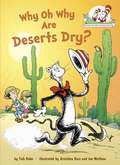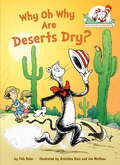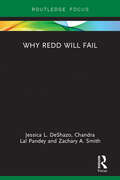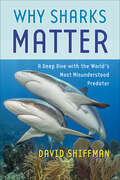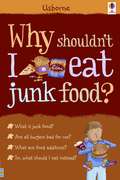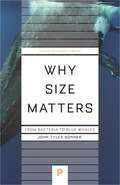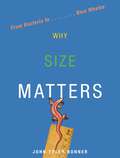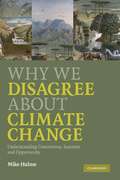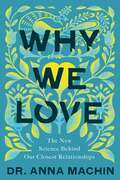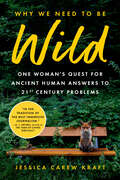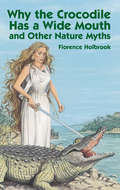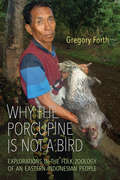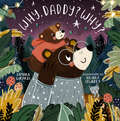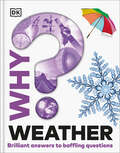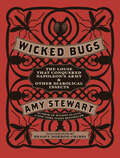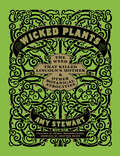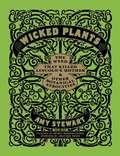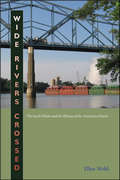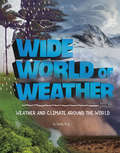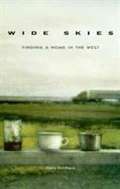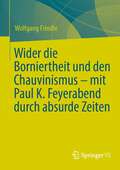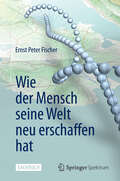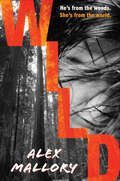- Table View
- List View
Why Oh Why Are Deserts Dry? All About Deserts
by Joe Mathieu Aristides Ruiz Tish RabeIn this latest installation of the Cat in the Hat's Learning Library, the Cat takes Sally and Dick to explore different kinds of deserts around the world, from the hot, dry Sonoran and Mojavi to the bitter cold Gobi and Antarctica. Young readers learn why deserts are dry, and how plants and animals--including cactus, kangaroos, camels, penguins, roadrunners, and many others--have adapted to survive the unforgiving climate. Also included: how sand dunes are formed; the reason we see mirages, and how shallow water beneath the surface of the ground can create an oasis. Fans of the new PBS preschool science show The Cat in the Hat Knows a Lot About That! (which is based on the Learning Library series) won't want to miss this hot new addition to the series!
Why Oh Why Are Deserts Dry? All About Deserts: All About Deserts (The Cat in the Hat's Learning Library)
by Tish RabeLaugh and learn with fun facts about desert animals, cacti, sand dunes, and more—all told in Dr. Seuss&’s beloved rhyming style and starring the Cat in the Hat! &“You may think that deserts are empty and bare, but you&’ll be surprised by the things we&’ll find there...&” The Cat in the Hat&’s Learning Library series combines beloved characters, engaging rhymes, and Seussian illustrations to introduce children to non-fiction topics from the real world! Journey through the deserts of the world and learn: how plants and animals have adapted to survive the unforgiving climatewhy deserts don&’t have to be hotwhat causes us to see miragesand much more! Perfect for story time and for the youngest readers, Why Oh Why Are Deserts Dry? All About Deserts also includes an index, glossary, and suggestions for further learning.Look for more books in the Cat in the Hat&’s Learning Library series!Cows Can Moo! Can You? All About FarmsHark! A Shark! All About SharksIf I Ran the Dog Show: All About DogsOh Say Can You Say Di-no-saur? All About DinosaursOn Beyond Bugs! All About InsectsOne Vote Two Votes I Vote You VoteThere&’s No Place Like Space: All About Our Solar SystemWho Hatches the Egg? All About EggsWish for a Fish: All About Sea Creatures
Why REDD will Fail (Routledge Studies in Environmental Policy)
by Zachary A. Smith Chandra Lal Pandey Jessica L. DeShazoReducing Emissions from Deforestation and forest Degradation (REDD) attempts to address climate change from one angle – by paying developing countries to slow or stop deforestation and forest degradation. Trumpeted as a way to both mitigate climate change and assist countries with development, REDD was presented as a win-win solution. However, there have been few attempts to understand and analyse the overall framework. Why REDD Will Fail argues that the important goals will not be met under the existing REDD regime unless the actual drivers of deforestation and forest degradation are diminished. The book delves into the problematic details of the regime, ranging from; national capacity to monitor results, the funding mechanism, the definition of a forest, leakage, and the impetus behind the drivers of deforestation and forest degradation. As the international community rallies around REDD and developed countries and companies are willing to commit substantial amounts to implement the scheme, this books seeks to address whether REDD has the potential to achieve its purported goals. This is an important resource for academics and students interested in the policy and management aspects of mitigating climate change, environmental policy, international relations and development studies as well as policy makers involved in the REDD process.
Why Sharks Matter: A Deep Dive with the World's Most Misunderstood Predator
by David ShiffmanGet submerged in the amazing world of sharks! Your expert host, award-winning marine biologist Dr. David Shiffman, will show you how—and why—we should protect these mysterious, misunderstood guardians of the ocean.Sharks are some of the most fascinating, most ecologically important, most threatened, and most misunderstood animals on Earth. More often feared than revered, their role as predators of the deep have earned them a reputation as a major threat to humans. But the truth is that sharks are not a danger to us—they're in danger from us.In Why Sharks Matter, marine conservation biologist Dr. David Shiffman explains why it's crucial that we overcome our misconceptions and rise above cinematic jump scares to embrace sharks as the imperiled and elegant ocean guardians they really are. Sharing his own fascinating experiences working with sharks, Shiffman tells us• why healthy shark populations are a must for supporting ocean ecosystems—and the coastal economies that depend on them • why we're in danger of losing many shark species forever• what scientists, conservationists, and readers can do to help save these iconic predators• why so much of what you've heard about sharks and how to save them is wrong Exploring the core tenets of shark conservation science and policy, Shiffman synthesizes decades of scientific research and policymaking, weaving it into a narrative full of humor and adventure. Touching on everything from Shark Week to shark fin soup, overfishing to marine sanctuaries, Shiffman reveals why sharks are in trouble, why we should care, and how we can save them. Perfect for shark enthusiasts, Why Sharks Matter is an approachable, informative guide to the world of shark conservation and the passionate, fascinating, brilliant people who work to understand and protect our oceans. This fun read will have you looking at sharks with a fresh perspective and an understanding that the survival of sharks is crucial to the survival of another apex predator—ourselves.
Why Shouldn't I Eat Junk Food?
by Adam Larkum Kate Knighton Nancy LeschnikoffThis is an informative guide to two of the hottest debates surrounding children today: Junk food and healthy eating. Written in a conversational style, this book offers children an approachable source of information on key subjects such as food labelling, the effects of eating too much junk food, the importance of a varied diet and how food is grown. It is accompanied by the witty and vibrant illustrations of Adam Larkum. It is written in conjunction with child nutrition experts.
Why Size Matters: From Bacteria to Blue Whales (Princeton Science Library #142)
by John Tyler BonnerJohn Tyler Bonner, one of our most distinguished and creative biologists, here offers a completely new perspective on the role of size in biology. In his hallmark friendly style, he explores the universal impact of being the right size. By examining stories ranging from Alice in Wonderland to Gulliver's Travels, he shows that humans have always been fascinated by things big and small. Why then does size always reside on the fringes of science and never on the center stage? Why do biologists and others ponder size only when studying something else—running speed, life span, or metabolism?Why Size Matters, a pioneering book of big ideas in a compact size, gives size its due by presenting a profound yet lucid overview of what we know about its role in the living world. Bonner argues that size really does matter—that it is the supreme and universal determinant of what any organism can be and do. For example, because tiny creatures are subject primarily to forces of cohesion and larger beasts to gravity, a fly can easily walk up a wall, something we humans cannot even begin to imagine doing.Bonner introduces us to size through the giants and dwarfs of human, animal, and plant history and then explores questions including the physics of size as it affects biology, the evolution of size over geological time, and the role of size in the function and longevity of living things.As this elegantly written book shows, size affects life in its every aspect. It is a universal frame from which nothing escapes.
Why Size Matters: From Bacteria to Blue Whales (Princeton Science Library #142)
by John Tyler BonnerWhy size plays such a big role in the living worldJohn Tyler Bonner, one of our most distinguished and creative biologists, here offers a completely new perspective on the role of size in biology. In his hallmark friendly style, he explores the universal impact of being the right size. By examining stories ranging from Alice in Wonderland to Gulliver's Travels, he shows that humans have always been fascinated by things big and small. Why then does size always reside on the fringes of science and never on the center stage? Why do biologists and others ponder size only when studying something else--running speed, life span, or metabolism?Why Size Matters, a pioneering book of big ideas in a compact size, gives size its due by presenting a profound yet lucid overview of what we know about its role in the living world. Bonner argues that size really does matter--that it is the supreme and universal determinant of what any organism can be and do. For example, because tiny creatures are subject primarily to forces of cohesion and larger beasts to gravity, a fly can easily walk up a wall, something we humans cannot even begin to imagine doing.Bonner introduces us to size through the giants and dwarfs of human, animal, and plant history and then explores questions including the physics of size as it affects biology, the evolution of size over geological time, and the role of size in the function and longevity of living things.As this elegantly written book shows, size affects life in its every aspect. It is a universal frame from which nothing escapes.
Why We Disagree About Climate Change
by Mike HulmeClimate change is not 'a problem' waiting for 'a solution'. It is an environmental, cultural and political phenomenon which is re-shaping the way we think about ourselves, our societies and humanity's place on Earth. Drawing upon twenty-five years of professional work as an international climate change scientist and public commentator, Mike Hulme provides a unique insider's account of the emergence of this phenomenon and the diverse ways in which it is understood. He uses different standpoints from science, economics, faith, psychology, communication, sociology, politics and development to explain why we disagree about climate change. In this way he shows that climate change, far from being simply an 'issue' or a 'threat', can act as a catalyst to revise our perception of our place in the world. Why We Disagree About Climate Change is an important contribution to the ongoing debate over climate change and its likely impact on our lives.
Why We Disagree about Climate Change: Understanding Controversy, Inaction and Opportunity
by Mike HulmeClimate change is not 'a problem' waiting for 'a solution'. It is an environmental, cultural and political phenomenon which is re-shaping the way we think about ourselves, our societies and humanity's place on Earth. Drawing upon twenty-five years of professional work as an international climate change scientist and public commentator, Mike Hulme provides a unique insider's account of the emergence of this phenomenon and the diverse ways in which it is understood. He uses different standpoints from science, economics, faith, psychology, communication, sociology, politics and development to explain why we disagree about climate change. In this way he shows that climate change, far from being simply an 'issue' or a 'threat', can act as a catalyst to revise our perception of our place in the world. Why We Disagree About Climate Change is an important contribution to the ongoing debate over climate change and its likely impact on our lives.
Why We Hate the Oil Companies: Straight Talk from an Energy Insider
by John HofmeisterAs president of Shell Oil, John Hofmeister was known for being a straight shooter, willing to challenge his peers throughout the industry. Now, he's a man on a mission, the founder of Citizens for Affordable Energy, crisscrossing the country in a grassroots campaign to change the way we look at energy in this country. While pundits proffer false new promises of green energy independence, or flatly deny the existence of a problem, Hofmeister offers an insider's view of what's behind the energy companies' posturing, and how politicians use energy misinformation, disinformation, and lack of information to get and stay elected. He tackles the energy controversy head-on, without regard for political correctness. He also provides a new framework for solving difficult problems, identifying solutions that will lead to a future of comfortable lifestyles, affordable and clean energy, environmental protection, and sustained economic competitiveness.
Why We Love: The New Science Behind Our Closest Relationships
by Dr. Anna MachinAn Oxford evolutionary anthropoloigst explores the ever-elusive science of love.
Why We Need to Be Wild: One Woman's Quest for Ancient Human Answers to 21st Century Problems
by Jessica Carew Kraft"In the tradition of the best immersive journalism." –A.J. Jacobs, author of The Year of Living BiblicallyA bold examination of how Paleolithic wisdom could solve our 21st century problemsJessica Carew Kraft, an urban wife and mom of two, was firmly rooted in the modern world, complete with a high-powered career in tech and the sneaking suspicion that her lifestyle was preventing her and her family from truly thriving. Determined to find a better way, Jessica quit her job and set out to learn about "rewilding" from people who reject the comforts and convenience of civilization by using ancient tools and skills to survive. Along the way, she learned how to turn sticks into fire, stones into axes, and bones into tools for harvesting wild food—and found an entire community walking the path back from our technology-focused, anxiety-ridden way of life to a simpler, more human experience.Weaving deep research and reportage with her own personal journey, Jessica tells the remarkable story of the potential benefits rewilding has for us and our planet, and questions what it truly means to be a human in today's world. For readers of A Hunter-Gatherer's Guide to the 21st Century and Hunt, Gather, Parent, Why We Need to Be Wild is a thought-provoking, unforgettable narrative that illuminates how we survived in the past, how we live now, and how each of us can choose to thrive in the years ahead. "Kraft shows us how we could all benefit from being a little less civilized." —Tiffany Shlain, author of 24/6: The Power of Unplugging One Day a Week
Why the Crocodile Has a Wide Mouth: and Other Nature Myths (The Land of Oz)
by Florence HolbrookThese fifty-four wonder-filled stories, adapted for curious young minds, describe in simple folktale style how many amazing creatures of the earth were created — and why they look and act as they do — and other natural phenomena.Learn why the rabbit is timid and the bear has a short tail. Find out how fire was brought to the Indians, and how summer came to the earth. Discover why the sea is salty and evergreen trees never lose their leaves. Meet the children in the moon and the first grasshopper.Enhanced by 29 illustrations, these beguiling narratives gathered from primitive cultures around the world will delight children, lovers of tall tales, and anyone interested in folklore from faraway lands.
Why the Porcupine is Not a Bird: Explorations in the Folk Zoology of an Eastern Indonesian People
by Gregory ForthWhy the Porcupine Is Not a Bird is a comprehensive analysis of knowledge of animals among the Nage people of central Flores in Indonesia. Gregory Forth sheds light on the ongoing anthropological debate surrounding the categorization of animals in small-scale non-Western societies.Forth's detailed discussion of how the Nage people conceptualize their relationship to the animal world covers the naming and classification of animals, their symbolic and practical use, and the ecology of central Flores and its change over the years. His study reveals the empirical basis of Nage classifications, which align surprisingly well with the taxonomies of modern biologists. It also shows how the Nage employ systems of symbolic and utilitarian classification distinct from their general taxonomy. A tremendous source of ethnographic detail, Why the Porcupine Is Not a Bird is an important contribution to the fields of ethnobiology and cognitive anthropology.
Why, Daddy? Why?
by Tamara GirardiBaby bear's favorite word is 'Why?' but daddy bear always responds with love and patience. The perfect book for new dads!
Why? Weather: Brilliant Answers to Baffling Questions (Why? Series)
by DKExplore the intriguing answers to more than 200 questions about weather and learn all about the real-time impacts of the climate crisis in this absorbing encyclopedia for kids.What happens inside a thundercloud? Why is the sky not always blue? How are hurricanes born? Why is climate change dangerous? This children's book helps inquisitive minds find out answers to all the questions they may have about weather and climate, and some they hadn't thought of! Featuring detailed explanations to weather wonders, extreme weather, the science of weather forecasting, and climate change, Why? Weather helps children become weather experts in no time. Each page asks and answers a different question, and features a quick quiz designed to cement new knowledge. Bursting with mind-boggling facts, stunning photography, and extensive diagrams, this visually appealing book will be treasured by every budding meteorologist.
Wicked Bugs: The Louse That Conquered Napoleon's Army & Other Diabolical Insects
by Amy StewartIn this darkly comical look at the sinister side of our relationship with the natural world,Stewart has tracked down over one hundred of our worst entomological foes—creaturesthat infest, infect, and generally wreak havoc on human affairs. From the world’s mostpainful hornet, to the flies that transmit deadly diseases, to millipedes that stop traffic, to the“bookworms” that devour libraries, to the Japanese beetles munching on your roses, Wicked Bugsdelves into the extraordinary powers of six- and eight-legged creatures.With wit, style, and exacting research, Stewart has uncovered the most terrifying and titillatingstories of bugs gone wild. It’s an A to Z of insect enemies, interspersed with sections thatexplore bugs with kinky sex lives (“She’s Just Not That Into You”), creatures lurking in the cupboard(“Fear No Weevil”), insects eating your tomatoes (“Gardener’s Dirty Dozen”), and phobiasthat feed our (sometimes) irrational responses to bugs (“Have No Fear”).Intricate and strangely beautiful etchings and drawings by Briony Morrow-Cribbs capturediabolical bugs of all shapes and sizes in this mixture of history, science, murder, and intriguethat begins—but doesn’t end—in your own backyard
Wicked Plants: The Weed That Killed Lincoln's Mother and Other Botanical Atrocities
by Amy Stewart Briony Morrow-Cribbs Jonathon RosenA tree that sheds poison daggers; a glistening red seed that stops the heart; a shrub that causes paralysis; a vine that strangles; and a leaf that triggered a war. In Wicked Plants, Stewart takes on over two hundred of Mother Nature’s most appalling creations. It’s an A to Z of plants that kill, maim, intoxicate, and otherwise offend. You’ll learn which plants to avoid (like exploding shrubs), which plants make themselves exceedingly unwelcome (like the vine that ate the South), and which ones have been killing for centuries (like the weed that killed Abraham Lincoln's mother). Menacing botanical illustrations and splendidly ghastly drawings create a fascinating portrait of the evildoers that may be lurking in your own backyard. Drawing on history, medicine, science, and legend, this compendium of bloodcurdling botany will entertain, alarm, and enlighten even the most intrepid gardeners and nature lovers.
Wicked Plants: The Weed that Killed Lincoln’s Mother and Other Botanical Atrocities
by Amy Stewart[From back cover] Beware! The Sordid Lives of Plants Behaving Badly. A tree that sheds poison daggers; a glistening red seed that stops the heart; a shrub that causes paralysis; a vine that strangles; and a leaf that triggered a war. Amy Stewart, bestselling author of Flower Confidential, takes on over two hundred of Mother Nature's most appalling creations in an A to Z of plants that kill, maim, intoxicate, and otherwise offend. Menacing botanical illustrations render a ghastly portrait of evildoers that may be lurking in your own backyard. Drawing on history, medicine, science, and legend, this compendium of bloodcurdling botany will entertain, enlighten, and alarm even the most intrepid gardeners and nature lovers.
Wide Rivers Crossed: The South Platte and the Illinois of the American Prairie (G - Reference, Information And Interdisciplinary Subjects Ser.)
by Ellen E. WohlIn Wide Rivers Crossed, Ellen Wohl tells the stories of two rivers—the South Platte on the western plains and the Illinois on the eastern—to represent the environmental history and historical transformation of major rivers across the American prairie. Wohl begins with the rivers’ natural histories, including their geologic history, physical characteristics, ecological communities, and earliest human impacts, and follows a downstream and historical progression from the use of the rivers’ resources by European immigrants through increasing population density of the twentieth century to the present day. During the past two centuries, these rivers changed dramatically, mostly due to human interaction. Crops replaced native vegetation; excess snowmelt and rainfall carried fertilizers and pesticides into streams; and levees, dams, and drainage altered distribution. These changes cascaded through networks, starting in small headwater tributaries, and reduced the ability of rivers to supply the clean water, fertile soil, and natural habitats they had provided for centuries. Understanding how these rivers, and rivers in general, function and how these functions have been altered over time will allow us to find innovative approaches to restoring river ecosystems. The environmental changes in the South Platte and the Illinois reflect the relentless efforts by humans to control the distribution of water: to enhance surface water in the arid western prairie and to limit the spread of floods and drain the wetlands along the rivers in the water-abundant east. Wide Rivers Crossed looks at these historical changes and discusses opportunities for much-needed protection and restoration for the future.
Wide World of Weather: Weather and Climate Around the World (Weather and Climate)
by Emily RaijFrom windswept deserts to rain-soaked forests, the world's climates experience weather unique to their place in the world. Discover how scientists study climates, the weather experienced in each one, and how climate impacts the people who live there.
Wide skies: Finding a Home in the West
by Gary Holthaus"Like many other Americans, judging from the amount of predawn traffic, I am on the move, scurrying through the dark like a coyote, nose down in pursuit of something-my work, an ephemeral desire that has no name, a life, an end of restlessness, a true place in the world. " A true place in the world: how many people have looked for it and how many have finally found it in the American West? Here, with writer Gary Holthaus, readers will reflect upon their own sense of place as they travel the lands and enter the lives of people in small towns and on ranches all over the West from Utah to Oregon to Alaska. Farmers and merchants, writers and teachers, btruckers and trappers: their stories ring with hope and fear as their wide-open spaces increasingly come under siege. Here are reflections on a long journey, together with notes of a personal odyssey and a plea for preserving the West's natural beauty-its meadows and mountains, its bears and Golden Eagles, its antelope and wolverines. This is important, says Holthaus, because if the region is home for him and for others, too, then it is crucial for newcomers and old-timers alike not to "further foul a nest that is becoming increasingly crowded. " As he finds his way and adjusts his eyes to modern realities of greed and indifference, he also comes to grips with loss and learns to balance "the harm one inevitably does" with acts of compassion and positive change. Deep in the national consciousness, the mythical West of film and fiction continues to shape our vision of ourselves as Americans. This book is a view not from the media, not from think tanks or legislators or policy makers, but from Westerners themselves, who tell us about the circumstances of their lives. Their West is indisputably the real West, and only as we come to understand better its realities will we come to know ourselves both as individuals and as a nation.
Wider die Borniertheit und den Chauvinismus – mit Paul K. Feyerabend durch absurde Zeiten
by Wolfgang FrindteAnlässlich seines 100. Geburtstages wird an Paul K. Feyerabend erinnert; es werden seine Ideen diskutiert und es wird gefragt, inwieweit diese geeignet sind, aktuelle Geschehnisse und Konflikte zu beurteilen.
Wie der Mensch seine Welt neu erschaffen hat
by Ernst Peter Fischer"Wissenschaft wird von Menschen gemacht" Mit diesem Zitat des Physikers und Humanisten Werner Heisenberg leitet Ernst Peter Fischer sein Buch über die "zweite Erschaffung der Welt" ein. Seiner Auffassung nach nehmen wir diesen einfachen und an sich selbstverständlichen Satz nicht zur Kenntnis und ernst, wie die Naturforscher mit ihren naturwissenschaftlichen und medizinischen Erträgen seit dem 17. Jahrhundert maßgeblich ihr und damit unser aller gegenwärtiges Leben geprägt und praktisch gestaltet haben. Er schreibt: "Tatsächlich ist es so, dass sich europäische Gesellschaften - nicht zuletzt die deutsche - im frühen 21. Jahrhundert nahezu vollständig und unumkehrbar in Abhängigkeit von wissenschaftlich-technischen Fortschritten etwa bei der Ressourcennutzung, der Energiegewinnung, der Krankenversorgung oder der Kommunikation entfaltet haben. Und ihre Geschichte - ihr Vorwärtsstreben in die derzeitige Lage und ihr Aussehen - kann man nur verstehen, wenn man die dazugehörige Dynamik berücksichtigt, wenn man also die Geschichte der Wissenschaften und der mit ihren Kenntnissen möglichen Technik zur Kenntnis nimmt, die in ihrer relevanten und aktuellen Form im frühen 17. Jahrhundert begonnen und den europäischen Sonderweg zum Wohlstand bereitet hat, den viele Millionen Menschen ganz selbstverständlich in wachsender Zahl genießen, ohne zu fragen, woher er kommt und welchen Ideen sie ihn zu verdanken haben."
Wild
by Alex MalloryCade, a teen raised alone in the wilderness, is thrust into civilization in this modern retelling of Tarzan.No one knows the forest better than Cade, who has spent his entire life there, foraging, hunting, and surviving. Raised to believe no one else is left in the world, he is shocked when he encounters Dara, a modern girl on a camping trip in his woods. And when an accident forces him back into society with her, he begins to question his entire life. Together, Cade and Dara attempt to handle their newfound celebrity as the media closes in. But the truth of Cade's past might be too much for either of them.Alex Mallory's action-packed and romantic tale is told from both Cade's and Dara's point of view and is perfect for fans of contemporary and dystopian YA as well as classic survival stories such as Hatchet, Lord of the Flies, and Tarzan.
